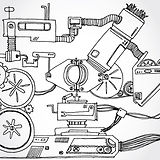BEATE KRICKEL

© Martin Brombacher
I am a philosopher of science and cognitive scientist. I work on the metaphysics of science, philosophy of neuroscience, cognitive science and psychology, and the metaphysics of mind and causation.
I am Professor for Philosophy of Cognition at TU Berlin. Before that I worked as a post-doctoral researcher, principal investigator, and scientific coordinator of the DFG-Research Training Group Situated Cognition at Ruhr-University of Bochum. I had a lecturer position at Humboldt University Berlin and at Westfälische Wilhelms University Münster. I studied Cognitive Science at University Osnabrück, Philosophy at Westfälische Wilhelms-University Münster. I obtained my PhD at Humboldt University Berlin.
My Research Projects
News
DFG funded project (04/24-03/27):
Mechanistic and representational explanation in cognitive neuroscience
In collaboration with Nir Fresco, we will investigate whether or how representational, computational and mechanistic explanation in cognitive neuroscience relate. We start from the observation of an (apparent) tension: neuroscientific mechanistic explanations can prima facie refer exclusively to factors within the brain. Representational properties, though, supervene on the organism’s relations to its external world and/or past. This raises, what we dub, the compatibility challenge: can explanations in cognitive neuroscience be simultaneously mechanistic and representational?
What 'constitutes' cognition?
Can the body or elements of the environment be constituents of cognitive processes? What does it mean to be a constituent of cognition? How can we empirically find constituents? As a part of the Meta-questions project, I investigate how we can empirically and theoretically distinguish inputs/outputs of cognition from constituents of cognition.
more
Mechanisms in Biology
Biologists explain phenomena by describing mechanisms that are responsible for these phenomena. What are mechanisms? What are the ontological commitments of biology implied by this explanatory practice? In a recent book and various articles, I provide a realist interpretation of mechanisms and show which consequences follow for philosophical theories of causation, constitution, levels of science, and explanation.
The Unconscious Mind
There is a growing consensus among psychologists and philosophers that many of our mental processes occur unconsciously. What does it mean for a mental process to be unconscious? How do scientists justify the postulation of unconscious mental processes? In a recent paper, I ask these questions with respect to one phenomenon that is currently a hot topic in philosophy and psychology: implicit bias.




